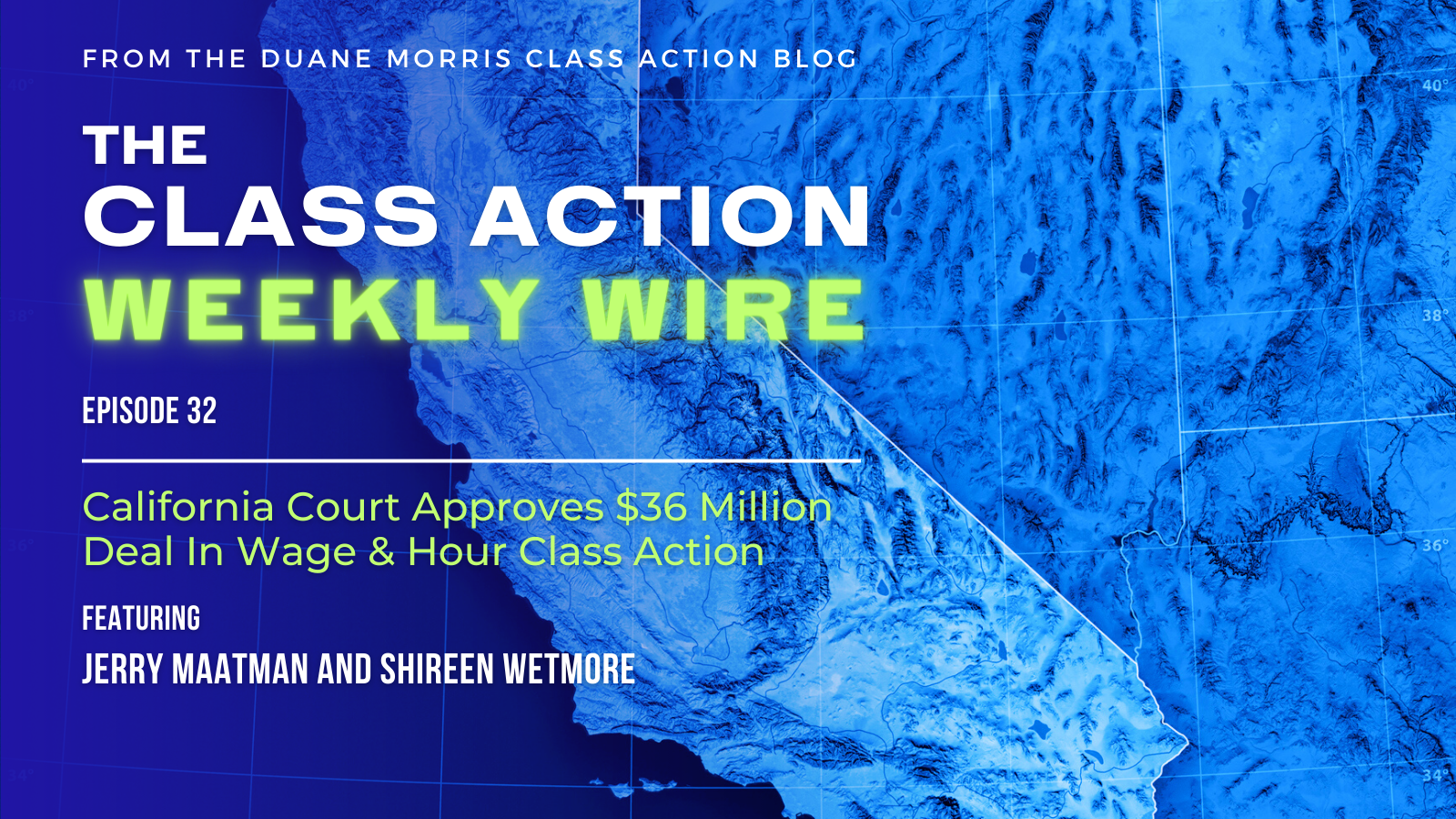
Duane Morris Takeaway: This week’s episode of the Class Action Weekly Wire features Duane Morris partners Jerry Maatman and Shireen Wetmore with their discussion of the $36 million settlement approved last week resolving claims from multiple cases in both federal and California state court challenging an employer’s wage and hour practices.
Check out today’s episode and subscribe to our show from your preferred podcast platform: Spotify, Amazon Music, the Samsung Podcasts app, Podcast Index, Tune In, Listen Notes, iHeartRadio, Deezer, or our RSS feed.
Episode Transcript
Jerry Maatman: Thank you loyal blog readers and listeners, welcome to our Friday weekly podcast series entitled The Class Action Weekly Wire. I’m very excited to welcome our guest, my partner Shireen Wetmore from our San Francisco office. Welcome, Shireen!
Shireen Wetmore: Thanks, Jerry. Happy to be here.
Jerry: Today we’re going to focus on and talk about a rather hefty settlement just approved by a court in the wage and hour space for $36 million. The name of the case is Fodera v. Equinox Holdings. Could you tell us and explain to our listeners some of the background behind a class action that would spike at $36 million?
Shireen: Of course, Jerry. Yeah, this settlement represents the resolution of claims from multiple cases in both Federal and California State Court. The settlement covers a class of over 15,000 hourly non-exempt employees and former employees of Equinox from around April 2015 through December 2022, as well as a PAGA group of non-exempt employees that includes fitness trainers and instructors. And plaintiffs alleged that Equinox, the gym where they were teaching classes and providing personal training, failed to pay for pre- and post-shift work. Plaintiffs also challenged Equinox policies regarding meal and rest breaks wage statements and other wage and hour practices. Alameda Superior Court Judge Herbert approved a final settlement just last week on September 21, 2023.
Jerry: California is a super tough place to do business, and certainly so for wage and hour liability. Many, many employers doing business in the Golden State end up receiving these sorts of lawsuits. In your opinion, and based on your thought leadership in this space, what do you think were the main takeaways from the problems in that case that resulted in a settlement of $36 million?
Shireen: You know, Jerry, oftentimes in these cases we see this with our clients all the time – settlement doesn’t always mean that there’s a problem, settlement doesn’t always mean that something wasn’t done properly – there are lots and lots of reasons why clients may choose to settle a case. Certainly a case with the scale and scope of one like this, where there’s multiple pieces of litigation progressing at the same time. That often counsels settlement, just to avoid some of the really complicated procedural issues and costs associated with litigation, as you very well know California, like you said, tough place to do business. Some of the highlights that are coming out of this particular case is that these plaintiffs claimed that they were paid per session rate for the fitness classes that they were teaching and that they weren’t getting compensation for pre- and post-shift work outside of the class time. And so they alleged that they were required to engage in certain activities, like recruiting potential students or participants, and wanted compensation for that time. Also the residual impacts of that type of work impacting their meal and rest periods.
Jerry: In terms of the overall settlement, where does this rank in calendar year 2023 among the major wage and hour class action settlements?
Shireen: That’s a great question. So far this year this settlement will go right in the middle, actually a little surprising for such a large recovery, but in the top 10 it would be the fifth largest so far this year.
Jerry: That’s incredible. I’m a believer that success begets copycats, and when there are large settlements, employers experience an uptick of lawsuits brought. Certainly workers, plaintiffs’ lawyers notice these big numbers. And so that’s one of the reasons the Duane Morris Class Action review tracks and analyzes large settlements. Given that feature of our system where success begets success. Well, thank you so much, Shireen, for joining us and providing us with your thought leadership. Great to have you on the show.
Shireen: Thanks for having me, Jerry. Thank you, listeners!
